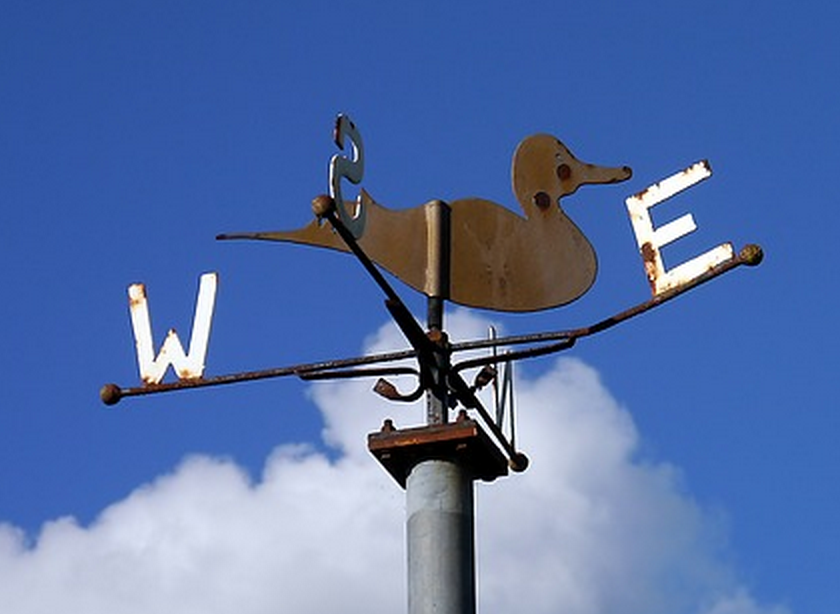Beware The Correction Of False Prices
Courtesy of Charles Gave of Gavekal Dragonomics

I want to start this paper by reiterating a few of my strongly held convictions about the role of central bankers:
- Economics is a branch of logic, itself a branch of philosophy, and not a branch of astrology (the good case) or mathematics (the bad case).
- So when I see the guardians of the Temple of Mammon—otherwise known as central bankers—following an illogical policy, I am mesmerized. I start to have doubts, either about my ability to follow a path of logical reasoning, or about the sanity of the current breed of central bankers. As far as the first option goes, our readers can decide, and the market will be the ultimate judge. As for the second, allow me to make a few remarks…
Four basic postulates for central bankers
To think ‘logically’ one generally starts with a few postulates learnt from experience. What should these postulates be for central bankers?
- I expect central bankers to know that the future is unknowable. This has been generally accepted wisdom at least since the time of the New Testament: “But of that day and hour knoweth no man.”
- Since Karl Popper, central bankers should know that the amount of risk in a system is roughly constant over time and that any effort to minimize risk or volatility at any point in time (usually just before an election) will lead to its more forceful re-emergence later on (hopefully after the election). In this sense an economic system is much like one of Alexander Calder’s mobiles: if you restrict the motion of one of its branches, any disturbance of the system will lead to much bigger movements elsewhere.
- Since Knut Wicksell, central bankers should know that the greater the difference between the ‘natural’ interest rate and the ‘market’ rate, the bigger the subsequent booms and busts. If sustained, a false price for the cost of money increases the risk in a system exponentially. A false price for interest rates leads to a false price for the exchange rate. From there all prices become false and the economy moves ex-growth, usually after a boom built on leverage and marked by a sharp rise in assets prices, followed by a bust when the carry traders get killed (as in the US housing market between 2002 and 2007).
- If a commercial bank is in difficulty, as a central banker I nationalize it. I guarantee all the depositors, I value the bank’s bonds and equity at zero, I recapitalize it and after five years I float it on the stock market once again, making five times my money. Finally I put the bankers in jail. In no circumstances do I protect the bankers, which would just guarantee economic stagnation for at least the next 20 years (compare Sweden in 1992 with Japan in 1992).
Once equipped with this formidable knowledge, there are a number of things that a ‘logical’ central banker should never do:
 1) He (or she) should never give forward guidance about his future actions to anybody—ever. To see why, let us assume that a well intentioned central banker guarantees market participants that he will not raise short rates for the next three years. In doing so, he is implying that he can see three years into the future, which is either idiocy or insanity (see the previous page). The extraordinary thing is that market participants, who know this guidance is idiotic, clamor for more and more of it, on the dubious pretext that if that guarantee were to be withdrawn, the markets would collapse. BS of a high order!
1) He (or she) should never give forward guidance about his future actions to anybody—ever. To see why, let us assume that a well intentioned central banker guarantees market participants that he will not raise short rates for the next three years. In doing so, he is implying that he can see three years into the future, which is either idiocy or insanity (see the previous page). The extraordinary thing is that market participants, who know this guidance is idiotic, clamor for more and more of it, on the dubious pretext that if that guarantee were to be withdrawn, the markets would collapse. BS of a high order!
2) If adhered to, this policy of ‘forward guidance’ would massively reduce the risks for borrowers over the next three years, so reducing risk on the liability side of leveraged positions. As a consequence it would benefit those that are closest to the central bank first, leading to a misallocation of capital through the ‘Cantillon effect’ (see The Cantillon Effect (And The Inevitable Demise of Financials)).
3) This form of forward guidance leads to ever-increasing leverage in the system, with the borrowed money used to buy existing assets with a cash flow higher than the cost of servicing the debt. The price of all assets goes up, and since assets are held by ‘rich’ people, not by poor people, the rich get richer. But the rich tend to buy existing assets—not build new assets, which by definition have uncertain cash flow—so the national stock of capital does not rise. As a result, productivity falls, the structural growth rate of the economy declines, and the poor get poorer. The Gini coefficient explodes, and society becomes more and more unstable.
4) If we believe Popper [above], the apparent reduction of risk today from forward guidance will lead to a massive increase in risk later. Since market participants will be more leveraged, when the bust eventually hits, the downturn will be bigger and society will end up poorer (again see the US housing sector; almost a text book example of what to expect when a central bank establishes a false cost of money).
5) Heeding Wicksell, or just common sense, central bankers should refrain from having a view on the price of money and should simply order their computers to keep short rates (e.g. Fed funds) 50bp below nominal GDP growth—permanently. If a crisis strikes because the stock market has become overexcited, they might consider, as Walter Bagehot advised, providing liquidity in infinite amounts but at a price, which for up to a year, but no longer, could be below my rule of thumb for short rates. Under no circumstances should central bankers attempt to manipulate long term interest rates or exchange rates, since they are not smart enough to understand the long term implications of those manipulations. If another country’s central bankers wants to try, fine. Every country has a right to do stupid things if it wants.
These are more or less the precepts that Paul Volcker followed after 1983, and Alan Greenspan during his first two terms.
Unfortunately, the policies that the current crop of central bankers are following are the exact opposite of what a logical central banker should do. This leads me to ask two questions:
- Not very interesting but important to answer: Why are central bankers behaving so illogically?
- Much more interesting, but alas almost impossible to answer: How is this going to end? And what patterns will I need to recognize to know that we are approaching the hour when the fat lady starts to sing?
I have come across quite a few possible answers to the first question. In no particular order of sanity:
-
The central bankers really do believe that they can forecast the future. This is the old ‘fatal conceit’ of Friedrich Hayek. We had a perfect example of such a belief when ‘scientific socialism’ was in vogue. The result was the untimely deaths of 100mn innocent people.
-
The central bankers are in the hands of the plutocrats and are following policies that favor their interests. If true, this is a political problem, to be dealt with by elected politicians. An audit of the central bank would go a long way to dispel suspicions.
-
The central bankers are in thrall to a political project which requires them to follow a policy that cannot work. Taking the euro as an example, it is obvious that within euroland there are different natural rates, so there should be different actual rates. A common interest rate will be too high for some countries and too low for others, so the system will keep diverging until it finally explodes. No amount of quantitative easing will ever work.
-
A new school of economic thought is emerging which we might call ‘touchy-feely Freudian Keynesianism’. For the economy to grow we need entrepreneurs to exhibit strong ‘animal spirits’. The way to develop this remarkable quality is for the central bankers to keep telling them that they can borrow money at a subsidized cost, which is proof that the central bankers really, really, love them (Freud). This is astoundingly stupid, since if the money is subsidized for me, it is also subsidized for my competitors, which guarantees that we will all go bust eventually. The logical reaction is therefore to stop borrowing and investing now, in order to maximize the cash flow I can get from my business, my ultimate goal being to shut up shop down the road.
-
The central bankers are clearly incompetent, never having worked in the real world. A common scenario—we have had plenty over history (names provided on request). The solution is to change the way we select our central bankers. In the US every time our central banker has had a PhD in economics, the story has ended badly. So perhaps we should exclude PhDs and hire farmers or small businessmen instead?
 I am sure the reader can think of other explanations: groupthink, a shortage of maternal love, bitter sibling rivalry etc… But trying to understand why people act stupidly is a thankless and largely hopeless task. The 18th Century French theologian Jacques-Benigne Bossuet summed it up best: “God laughs at those who deplore the effects of the causes that they cherish.”
I am sure the reader can think of other explanations: groupthink, a shortage of maternal love, bitter sibling rivalry etc… But trying to understand why people act stupidly is a thankless and largely hopeless task. The 18th Century French theologian Jacques-Benigne Bossuet summed it up best: “God laughs at those who deplore the effects of the causes that they cherish.”
In this case the effects are false prices where ever we look. As I shall never tire of explaining, if you manipulate interest rates and exchange rates, you will create false prices all over the place, since interest rates and exchange rates are the prices which determine all others.
Today we have false prices all over the world. Recently, some of these false prices have started to return to their long term equilibrium levels. Since a lot of money was invested at the old ‘false’ prices, when this happens large amounts of money are lost in a very short period of time, which tends to be very recessionary.
Firstly, the return to market-determined prices is always and everywhere recessionary. Secondly, in today’s world it is deflationary to boot. For example, the de-pegging of the Swiss franc is deflationary for Switzerland, but also for the rest of the world since a lot of money has been lost and these losses imply a lower banking multiplier in so far as the leverage was financed by commercial banks.
Another false price was the price of a barrel of oil. In the past I often mentioned the relationship between negative real rates in the US and the rising price of oil. Then, when the Fed announced it was ready to raise short rates, the price of oil started to tumble. Surely this is no coincidence. The fall in oil prices is massively deflationary and recessionary for the producers, and kind of expansionary for the consumer, providing of course that commercial banks do not go bust in the middle, having lent tons of money to the oil producers.
Today the yen is certainly at a false price, being more than two standard deviations undervalued relative to its purchasing power parity against the US dollar. Right now I would not hedge the yen.
Ever since 2002, the Fed has relentlessly manipulated the US dollar downwards, to the point where, according to the Bank for International Settlements, US$9trn have been borrowed by people or entities with no cash flow in dollars. With the US current account deficit (the only primary source of earned reserves) contracting sharply, covering US$9trn in short sales is going to be interesting to watch.
 Then we have the mother of all false prices: the Euro. In the financial sphere, no euro-denominated price is market-determined, from the exchange rate (the euro is far too weak for Germany and far too strong for Italy) to interest rates (if anybody believes that long rates in euroland are at market prices, please tell me your definition of a market price), to the share prices of financials, insurance companies and utilities threatened with bankruptcy by zero or negative interest rates, to pension funds unable to compute the present value of their assets and liabilities.
Then we have the mother of all false prices: the Euro. In the financial sphere, no euro-denominated price is market-determined, from the exchange rate (the euro is far too weak for Germany and far too strong for Italy) to interest rates (if anybody believes that long rates in euroland are at market prices, please tell me your definition of a market price), to the share prices of financials, insurance companies and utilities threatened with bankruptcy by zero or negative interest rates, to pension funds unable to compute the present value of their assets and liabilities.
Gold, the canary in the coal mine, has probably seen its price manipulated by central bankers who did not want the population to be alarmed because that could have had an impact on the ‘animal spirits’ of the entrepreneurs. If I were managing money for French, Spanish or Italian clients, I would own positions in gold, but not if I were managing money on behalf of US, German, Chinese or Japanese clients.
Stock markets are probably vulnerable because central bankers have told market participants that they would stamp out the tail risk, and if necessary would buy directly (see the Bank of Japan); a false price if I ever saw one.
So my advice is either to use the false prices to play a return to market- determined prices—long the US dollar, long medium duration US government bonds, short medium duration French bonds—or to invest in regions which are attempting to re-establish market-determined prices, such as Asia under Chinese leadership.
Once again: we always return to market prices and these returns are both recessionary and deflationary. So fasten your seat belts. The return to market-determined prices has probably already started.
Republished with Permission from Charles Gave.
© Gavekal Ltd. Redistribution prohibited without prior consent. This report has been prepared by Gavekal mainly for distribution to market professionals and institutional investors. It should not be considered as investment advice or a recommendation to purchase any particular security, strategy or investment product. References to specific securities and issuers are not intended to be, and should not be interpreted as, recommendations to purchase or sell such securities. Information contained herein has been obtained from sources believed to be reliable, but not guaranteed.
[Pictures via Pixabay: the Solar System is here, the weather vane is here and the Euro is here. Laughing Buddha source here. ~ Ilene]



